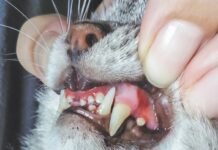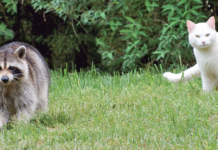Q: My question is about the current clay hard clumping litter that is used today. I am concerned about my cats cleaning their paws after using this litter. Is it possible that they could consume enough of this litter that it could clump in their stomach or intestines and cause intestinal obstruction over time? Thanks for your insights!
A: Thanks for getting in touch, and I understand your concerns about this commonly used type of cat litter. Gastrointestinal (GI) obstruction can be a serious issue in cats, and taking steps to avoid it makes perfect sense.
While I am not aware of a controlled study investigating the risks of clumping clay litter in cats, perhaps a few points regarding this issue will help.
Sodium bentonite is a water-absorbent mineral clay that is commonly used in clumping cat litters. Sodium bentonite’s water-absorptive properties—it expands to roughly 15 times its volume when it absorbs water—are what makes clay litters containing it clump, and while this can make litter easier to clean, concerns regarding its potential risks to cats have been raised previously.
Anecdotal reports suggest that cats that ingest large quantities of litter containing sodium bentonite may be at increased risk of GI obstruction.
This is a particular concern with kittens, whose curiosity may prompt them to ingest relatively higher quantities of litter while grooming or playing in the litterbox. This, combined with their small size, may predispose them to GI obstruction if they ingest litter that contains sodium bentonite, either deliberately or accidentally while they are grooming themselves.
Sodium bentonite is fairly inert. While I am not aware of any definitive evidence that it is chemically or metabolically toxic to cats, there have been reports of illness in cats that have a propensity to ingest clumping clay cat litters. These cats were said to experience illness characterized by low red blood cells counts, low blood potassium, and muscle weakness, all of which are commonly seen in people diagnosed with toxicity due to chronic bentonite exposure.
Overall, it seems that the jury is still out on the risks of clumping cat litters containing sodium bentonite to cats, and further study of this issue is warranted.
My intuitive sense, based solely upon my own experience and understanding of the sparse literature that is available on the subject of concerns with clumping litter, is that if there are risks, they are likely not extremely high.
I say this because this type of kitty litter is very commonly used in many households, and I would assume that if these risks were high, reports of problems associated with these types of litter would be more frequent.
Of course, the latter is purely speculation, and until further scientifically based studies are carried out to find out for certain, any comments on the issue of clumping litter and cat safety are likely to remain in the realm of conjecture.
In the interim, it makes sense to carefully monitor your cat’s litterbox habits, and if you notice that he/she is ingesting litter in any significant quantity, a discussion with your veterinarian about the best litter options for your cats is in order.



